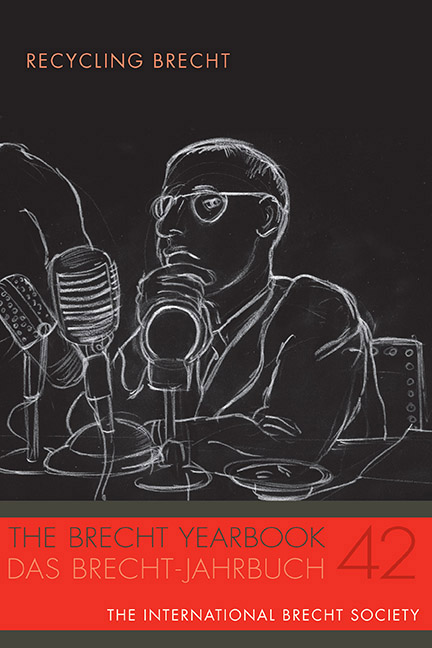Brecht Translating / Translating Brecht
Published online by Cambridge University Press: 09 April 2021
Summary
Recycling
There is hardly a more appropriate theme than recycling—the stubborn return of the “same”—that exemplifies the fundamental gesture of culture and even more so of the theater. Almost the entire repertoire of art consists of repetition, copy, and variation. Shakespeare invented not a single one of his numerous subjects. Reading a modern guide to dramas can seem like leafing through an encyclopedia of mythology. Réécriture—rewriting—is the law of culture: quotation, not originality in terms of content. The theater in particular repeats, quotes, copies, frequently oscillating between pastiche and parody, preexisting themes, subjects, figures, the entire course of narrative events. Since this process crosses not only the boundaries of language but also those between cultures and genres, we are confronted with a sort of translation in the broadest sense of the term—Übersetzung as Über-Setzen, carrying over.
With the modelbook of the 1948 staging of his Antigone, Bert Brecht provided a further dimension to the productive quality of copying. It must be immediately obvious that to see the modelbook as a guide for slavish imitation is to misunderstand it completely. The model is to be treated with confidence; it lives on only through adaptation. From the perspective of language Brecht's adaptation of the Sophoclean tragedy is based on Hölderlin's translation. With unusual modesty Brecht chose the title The Antigone of Sophocles: A Version for the Stage after Hölderlin's Translation. From the perspective of content Brecht's adaptation is certainly a radical reinterpretation of the classical plot. Antigone became for Brecht a play about Hitler's fascism. Creon is called “my Führer.” Like Hitler, at the end he wants to take Argos down with him: “And it shall fall …” He indirectly kills his own child. For Brecht, Haemon is supposed to be Creon's weapon of war in the final hour, like Hitler's “generation of 1929.” Creon's hope for a final victory—“another battle”—is a deceptive illusion (and propaganda), just as it was for the Nazis. Here it is a question of the suicidal or suicidally inclined state. The real “attraction” of the Antigone play is rather “the role of violence in the breakdown of the state authority”—that is, something with little relation to the Sophoclean tragedy.
- Type
- Chapter
- Information
- The Brecht Yearbook / Das Brecht-Jahrbuch 42Recycling Brecht, pp. 1 - 20Publisher: Boydell & BrewerPrint publication year: 2018



